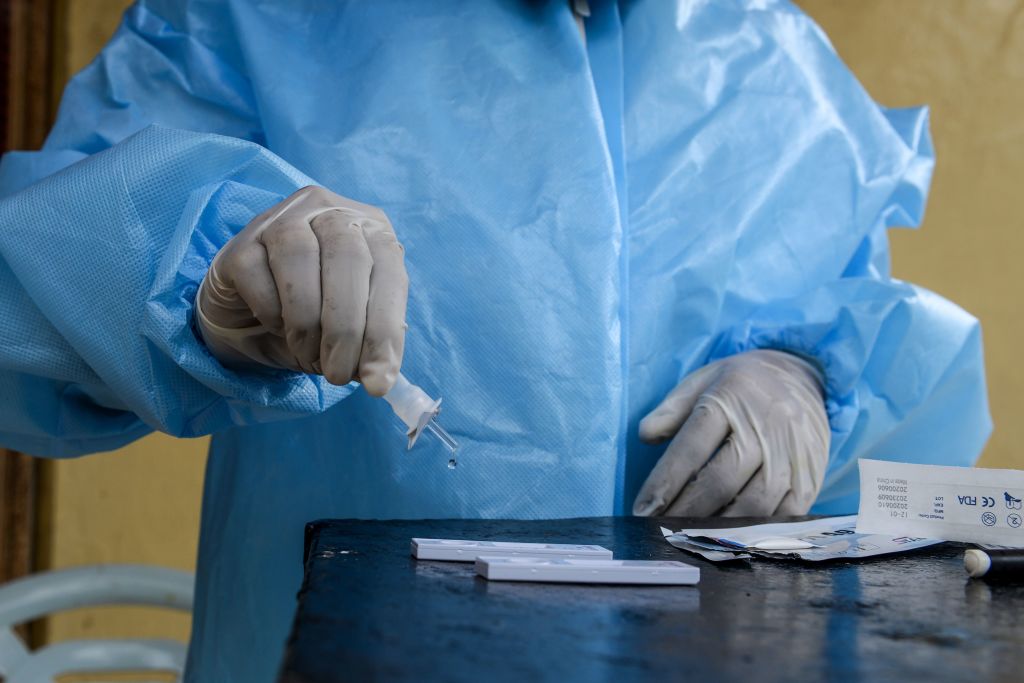A paper coronavirus test could effectively replace more expensive, less accurate antigen tests in India


A free daily email with the biggest news stories of the day – and the best features from TheWeek.com
You are now subscribed
Your newsletter sign-up was successful
India has the world's second highest coronavirus case count and appears to be on pace to overtake the United States in the next few weeks. To counter the rising number of infections, the country has scaled up testing. It hasn't been an easy process, but now 1 million samples are tested daily across more than 1,200 labs, and a newly-developed paper-based test that uses CRISPR gene-editing tools to detect the virus could become the third type of test — after PCR and antigen — to bolster the national diagnostic effort, BBC News reports.
The new test, called Feluda after a famous fictional Indian detective, employs a nasal swab and can return results in less than hour, making it faster than PCR tests. Its 96 percent sensitivity and 98 percent specificity rate means it will likely be more accurate than the rapid antigen tests. It would also reportedly be more affordable than both. In short, there's hope it could be the best of the both worlds. "The new test has the reliability of the PCR test, is quicker and can be done in smaller laboratories which don't have sophisticated machines," said Dr. Anurag Agarwal, the director of the Delhi-based CSIR-Institute of Genomics and Integrative Biology, where Feluda was developed.
Dr. Stephen Kissler, a research fellow at Harvard Medical School, told BBC that if Feluda's "efficacy is demonstrated, it can have benefits that ripple around the world." The next step for the development team is to build a prototype of a similar test that can be done from home. Read more at BBC.
The Week
Escape your echo chamber. Get the facts behind the news, plus analysis from multiple perspectives.

Sign up for The Week's Free Newsletters
From our morning news briefing to a weekly Good News Newsletter, get the best of The Week delivered directly to your inbox.
From our morning news briefing to a weekly Good News Newsletter, get the best of The Week delivered directly to your inbox.
A free daily email with the biggest news stories of the day – and the best features from TheWeek.com
Tim is a staff writer at The Week and has contributed to Bedford and Bowery and The New York Transatlantic. He is a graduate of Occidental College and NYU's journalism school. Tim enjoys writing about baseball, Europe, and extinct megafauna. He lives in New York City.
-
 ‘Restaurateurs have become millionaires’
‘Restaurateurs have become millionaires’Instant Opinion Opinion, comment and editorials of the day
-
 Earth is rapidly approaching a ‘hothouse’ trajectory of warming
Earth is rapidly approaching a ‘hothouse’ trajectory of warmingThe explainer It may become impossible to fix
-
 Health insurance: Premiums soar as ACA subsidies end
Health insurance: Premiums soar as ACA subsidies endFeature 1.4 million people have dropped coverage
-
 Trump HHS slashes advised child vaccinations
Trump HHS slashes advised child vaccinationsSpeed Read In a widely condemned move, the CDC will now recommend that children get vaccinated against 11 communicable diseases, not 17
-
 FDA OKs generic abortion pill, riling the right
FDA OKs generic abortion pill, riling the rightSpeed Read The drug in question is a generic version of mifepristone, used to carry out two-thirds of US abortions
-
 RFK Jr. vaccine panel advises restricting MMRV shot
RFK Jr. vaccine panel advises restricting MMRV shotSpeed Read The committee voted to restrict access to a childhood vaccine against chickenpox
-
 Texas declares end to measles outbreak
Texas declares end to measles outbreakSpeed Read The vaccine-preventable disease is still spreading in neighboring states, Mexico and Canada
-
 RFK Jr. shuts down mRNA vaccine funding at agency
RFK Jr. shuts down mRNA vaccine funding at agencySpeed Read The decision canceled or modified 22 projects, primarily for work on vaccines and therapeutics for respiratory viruses
-
 Measles cases surge to 33-year high
Measles cases surge to 33-year highSpeed Read The infection was declared eliminated from the US in 2000 but has seen a resurgence amid vaccine hesitancy
-
 Kennedy's vaccine panel signals skepticism, change
Kennedy's vaccine panel signals skepticism, changeSpeed Read RFK Jr.'s new vaccine advisory board intends to make changes to the decades-old US immunization system
-
 Kennedy ousts entire CDC vaccine advisory panel
Kennedy ousts entire CDC vaccine advisory panelspeed read Health Secretary RFK Jr. is a longtime anti-vaccine activist who has criticized the panel of experts
